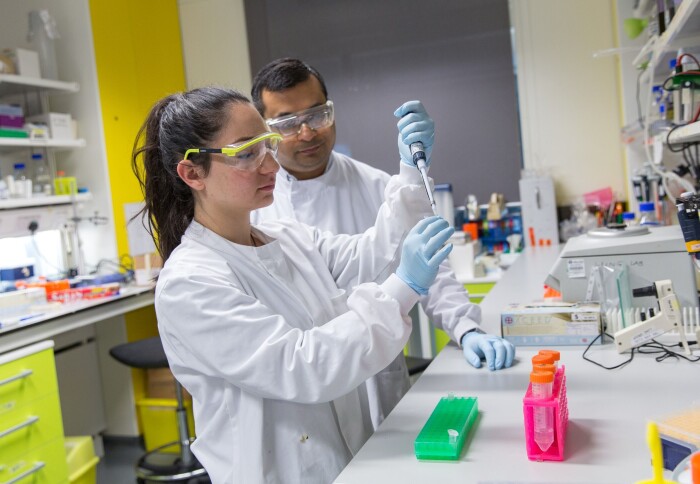Convergence Science Centre receives £8.9M for clinician research training

Cancer Research UK has awarded Imperial's Convergence Science Centre £8.9 million to train a new generation of clinician scientists.
The funding will allow the joint Imperial/ICR Convergence Science Centre to train more doctors in the skills they need to undertake cancer research.
Clinical academic researchers, or clinician scientists, play an essential role in translating cancer research, as they bridge the gap between the scientific research done in laboratories and the clinical research involving patients. Working across both research settings, their contributions to new knowledge and its translation to clinical practice are essential for progress in cancer research.
The Clinical Academic Training Programme at the Convergence Science Centre will take the form of fellowships for qualified doctors and intercalated PhDs for medical students.
The award to Imperial is part of Cancer Research UK’s Clinical Academic Training Programme Award worth £58.7 million to its research centres in universities and NHS Trusts across Scotland and England, which was announced today.
It builds on the 5-year £50.7 million investment awarded by the charity in 2019, meaning Cancer Research UK will have invested more than £109 million in this programme over ten years. The charity funds 50% of all publicly-funded research in the UK.
Professor Axel Behrens, Director of the CRUK Convergence Science Centre, said: "A crucial aspect of our mission is to train the next generation of clinical scientists, endowing them with the ability to use multidisciplinary approaches and to translate that into tangible benefits for cancer patients. The successful renewal of the joint Imperial/ICR Clinical Academic Training Programme until 2029 will enable the CSC to continue to train the future leaders in clinical academic research."
Also welcoming the renewing of the funding, Professor Iain McNeish, Co-chair of the Convergence Science Centre Clinical Training Subcommittee and Head of the Divison of Cancer at Imperial, said: "This programme will allow us to train the next generation of clinical academic cancer researchers across all medical and surgical specialties, and help us translate our best discovery research towards the clinic."
He added: "I am particularly pleased that we will be able to continue our intercalated PhD programme, allowing the excellent medical students at Imperial to take three years out of their undergraduate studies to get an early exposure to convergence cancer research. I look forward to working with colleagues in the ICR to ensure the success of this programme over the next five years.”
Flexible training options
Becoming a clinician scientist usually involves doctors taking time out of their medical training to undertake a PhD, before returning to train in their chosen specialisation, but many clinicians don’t come back to research after qualifying as consultants. This may be due to existing pressure on the healthcare system and lack of available funding.
Nearly three quarters (74%) of clinical research staff surveyed by Cancer Research UK in 2023 said that it has become harder to deliver research in a timely manner in the last 18 months, with 78% of respondents describing wider pressures on the health service as a substantial or extreme barrier.
To address this problem, Cancer Research UK awards funding to provide flexible training options alongside mentorship and networking opportunities to better support clinicians who want to get involved and stay in cancer research, through building stronger clinician scientist networks within and across research institutes.
In particular, the funding allows universities to offer combined Bachelor of Medicine-Doctor of Philosophy (MB-PhD) qualifications to early career clinicians – which allows medical students to complete a PhD earlier in their medical training.
Data from the Medical Schools Council Clinical Academic Survey reports a decline in the number of clinical academic positions between 2011–2020. US data also suggests that offering combined MB-PhD qualifications retains more women in clinical research roles.
Michelle Mitchell, Cancer Research UK’s Chief Executive, said: “Clinician scientists have a very important role to play by bringing their knowledge and experience of treating people with cancer to scientific research.
“We need all our doctors and scientists to be able to reach their full potential, no matter their background. That’s why we are continuing to provide flexible training options for early-career clinician scientists. After the success of the first five years of this programme, we want to encourage even more clinicians to get involved in cancer research to help us get closer to a world where everybody lives longer, better lives free from the fear of cancer.”
Photo credit: Imperial College London
This report was based on press materials from Cancer Research UK.
Article supporters
Article text (excluding photos or graphics) © Imperial College London.
Photos and graphics subject to third party copyright used with permission or © Imperial College London.
Reporter
Samantha Rey
Communications Division
Benjie Coleman
Department of Surgery & Cancer